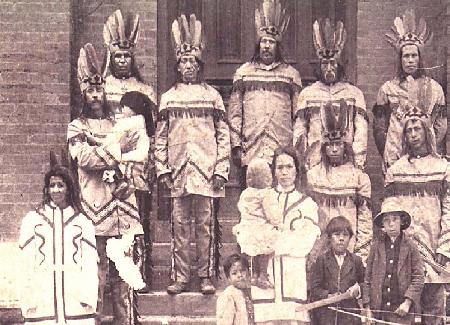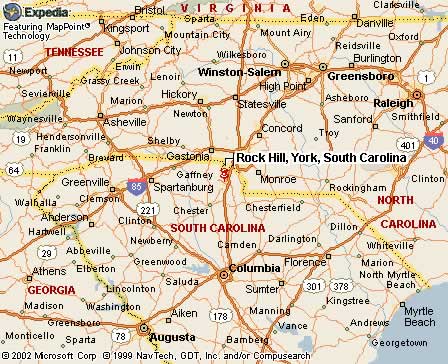|
|
Canku Ota |
|
|
(Many Paths) |
||
|
An Online Newsletter Celebrating Native America |
||
|
December 14, 2002 - Issue 76 |
||
|
|
||
|
Festival is Taste of Heritage |
||
|
by Christina Breen Charlotte
Observer
|
||
|
Photo: Catawba Corn Expo of 1913
|
 ROCK
HILL, SC - Pat Blue grew up not knowing much about his Catawba Indian
heritage, but his small sons heard the beat of Indian drums even before
they were born. ROCK
HILL, SC - Pat Blue grew up not knowing much about his Catawba Indian
heritage, but his small sons heard the beat of Indian drums even before
they were born. On Saturday, Blue performed a traditional men's dance at the 13th annual Yap Ye Iswa, or "Day of the Catawba," festival at the tribe's cultural center in Rock Hill. He wore a feathered headdress and a circular fan of golden eagle feathers on his back. Bells were strapped around his ankles, and he jingled as he walked. He hopes his sons, 7-year-old Charles and 3-year-old Austin, carry on the Catawba tradition. "They've got an opportunity we didn't have," Blue said. "I always wanted to be a part of it." Blue's great-grandfather was a Catawba Indian Nation chief. But as a boy, the closest Blue got to experiencing Native American life was visiting the Cherokee reservation four hours away in the N.C. mountains. His own tribe lacked federal recognition and his family rituals had tapered off. That changed in 1993, once the Catawbas' tribal recognition was restored and new cultural programs were born. Blue learned the dances and music of his ancestors and performs them for church and school groups and in competitions. At Yap Ye Iswa, the tribe's culture and pageantry carry the day. Lines 15 people deep snaked out from windows where tribe members served up traditional Indian fry bread (flat flour dough fried in vegetable oil) with honey. Equally popular were the Indian tacos -- fry bread heaped with chili, lettuce, tomatoes, onions, cheese and salsa. Throughout the crisp, sunny afternoon, vendors sold Native American drums, dream catchers, pottery and jewelry. Florence Wade, an 80-year-old Catawba Indian potter, pointed out two special pieces for an engaged couple who walked up to her table: a wedding jug and a peace pipe. The wedding jug, two spouts at the top, is used in traditional Native American wedding ceremonies. The peace pipe was a palm-size small bowl with four spouts branching off. "You have to get one of these, because if you have any problems between you, you smoke out of it and your problems will go right away," Wade said. Inside the cultural center, visitors perused a new exhibit highlighting Catawba Indians' struggle for equal education and honoring members who have college and graduate degrees. "We get a lot of people who say they didn't know we even existed," said Wenonah Haire, director of the Catawba Cultural Preservation Project. A few years ago, Haire was shocked to find that an elementary textbook circulating in Charlotte-Mecklenburg schools reported that the Catawba Indian Nation was extinct In reality, more than 2,500 members are enrolled as Catawba Indians, Haire said. "We need to educate the public about us," she said. "If you keep a heritage tucked away, it doesn't have the opportunity to be shared and appreciated."
|
||||||||
|
|
||
|
|
||
| Canku Ota is a free Newsletter celebrating Native America, its traditions and accomplishments . We do not provide subscriber or visitor names to anyone. Some articles presented in Canku Ota may contain copyright material. We have received appropriate permissions for republishing any articles. Material appearing here is distributed without profit or monetary gain to those who have expressed an interest. This is in accordance with Title 17 U.S.C. section 107. | ||
|
Canku Ota is a copyright © 2000, 2001, 2002 of Vicki Lockard and Paul Barry. |
||
 |
 |
|
|
The "Canku Ota - A Newsletter Celebrating Native America" web site and its design is the |
||
|
Copyright © 1999, 2000, 2001, 2002 of Paul C. Barry. |
||
|
All Rights Reserved. |
||
